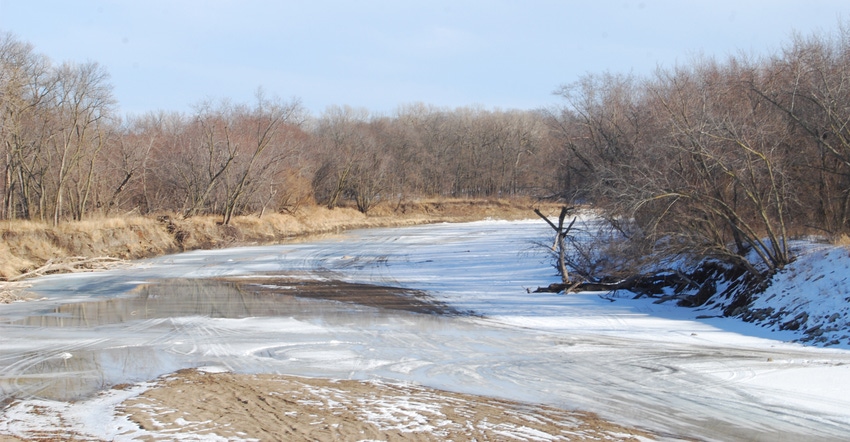February 24, 2017

On Jan. 27, the Iowa Supreme Court issued a ruling favoring the drainage districts in three northwest Iowa counties in the high-profile Des Moines Water Works nitrate litigation. This ruling likely means that the federal court will enter summary judgment in favor of the districts with respect to DMWW’s claims for money damages and injunctive relief. Further implications of the opinion are still up for debate, as was evidenced in a joint status report filed by the parties on Feb. 13.
As we’ve explained in past articles, this litigation arose March 16, 2015, when the DMWW trustees filed a federal Clean Water Act lawsuit against 10 drainage districts (and their trustees) in Buena Vista, Sac and Calhoun counties in Iowa. The lawsuit, which was filed in U.S. District Court for the Northern District of Iowa, asserts causes of action falling into two categories:
Counts 1 to 2. Claims under the CWA and Iowa Code Chapter 455B suggesting that discharges from drainage districts are “point sources” of nitrate pollution for which a National Pollutant Discharge Elimination System (NPDES) permit is required.
Counts 3 to 10. Claims seeking money damages and injunctive relief under Iowa common law and statutory theories of negligence, nuisance and trespass. The second category of claims also contains allegations that the districts took DMWW’s property without just compensation when they allowed nitrates to flow into the Raccoon River and that denying DMWW the right to collect money damages against the districts would deprive DMWW of its constitutional rights.
Iowa Supreme Court says no
In January 2016, Judge Leonard Strand, the federal district court judge assigned to this case, decided that the Iowa Supreme Court was best positioned to answer the important issues of state law raised by the second category of claims. The district court then certified and sent four questions to the Iowa Supreme Court:
• whether drainage districts could be liable for money damages in response to a tort action
• whether a court could grant injunctive relief against a drainage district
• whether DMWW could assert constitutional rights under the Iowa Constitution
• whether DMWW had a property right in the water flowing into its facility
The Iowa Supreme Court answered “no” to all of these questions.
The court relied on past decisions in stating “for over 100 years,” it has been the law in Iowa that “a drainage district is not susceptible for a suit for money damages. It has no corporate existence for that purpose.” The court continued, “A century’s worth of precedent, including a case our court decided unanimously just four years ago, precludes any remedy against drainage districts other than mandamus.”
Mandamus is a special action that allows a court to direct a drainage district to perform an action the drainage district is statutorily required to perform.
Who owns the Raccoon River?
The Iowa Supreme Court also ruled that the Raccoon River is owned by the state of Iowa, not DMWW, and that DMWW, as a public entity, could not assert a takings claim against another political subdivision of the state.
The court found that the Iowa Constitution “does not provide a basis for one public entity to sue another over the use of state-owned assets. … It makes sense to limit litigation between public entities because the people of Iowa foot the bill for both sides.”
The court continued, “The DMWW’s claim that putting nitrates into the Raccoon River creates a public nuisance is at odds with its own practice of depositing those nitrates back into the same river. Under the circumstances, it has failed to state an actionable takings claim under the Iowa Constitution.”
While DMWW and the drainage districts agree that the Iowa Court’s ruling prevents DMWW from recovering money damages against the drainage districts, the parties’ agreement as to the meaning of the court’s opinion essentially ends there.
In a joint status report filed with the federal district court Feb. 13, the parties detailed their respective positions.
DMWW argues that the federal court must still determine whether a viable claim for a federal constitutional violation remains. The districts, on the other hand, argue that the Iowa Court’s decision disposed of all claims in Counts 3 through 10 described earlier.
Federal law vs. state law
The major disagreement between the parties centers on the Clean Water Act claims, Counts 1 and 2 of the action. DMWW argues that the Iowa Supreme Court decision has no impact on this part of the lawsuit because the certified questions did not address these claims. The motion for partial summary judgment the federal court was addressing was the motion pertaining to Counts 3 through 10.
DMWW argues that federal environmental law pre-empts state law and that the districts already comply with various federal laws, such as federal dredge and fill, and wetland mitigation regulations. DMWW states that drainage districts have the power to do what is necessary to keep draining. If that includes obtaining a permit, DMWW reasons, Iowa law cannot foreclose that duty.
For their part, the districts agree that the Iowa Court’s answers to the certified questions did not specifically address Counts 1 and 2. They argue, however, that the answers determined Iowa law, which is binding on the federal court in making its ruling on these claims.
The districts specifically allege that there is no redressability for DMWW’s Clean Water Act claims against the districts, because the districts do not have the power under Iowa law to perform the tasks requested by DMWW.
The districts assert that redressability, which is the ability of the court to order the relief demanded against the party being sued, is a matter of state law.
Both parties agree that a June 26 trial date (if necessary) remains feasible. They also agree that “time and resources are limited.” It is likely that the federal court will issue rulings on the pending motions for partial summary judgment soon. We will keep you posted as further developments unfold.
Tidgren is staff attorney and assistant director for the Center for Ag Law and Taxation at Iowa State University. Read more at calt.iastate.edu.
About the Author(s)
You May Also Like






